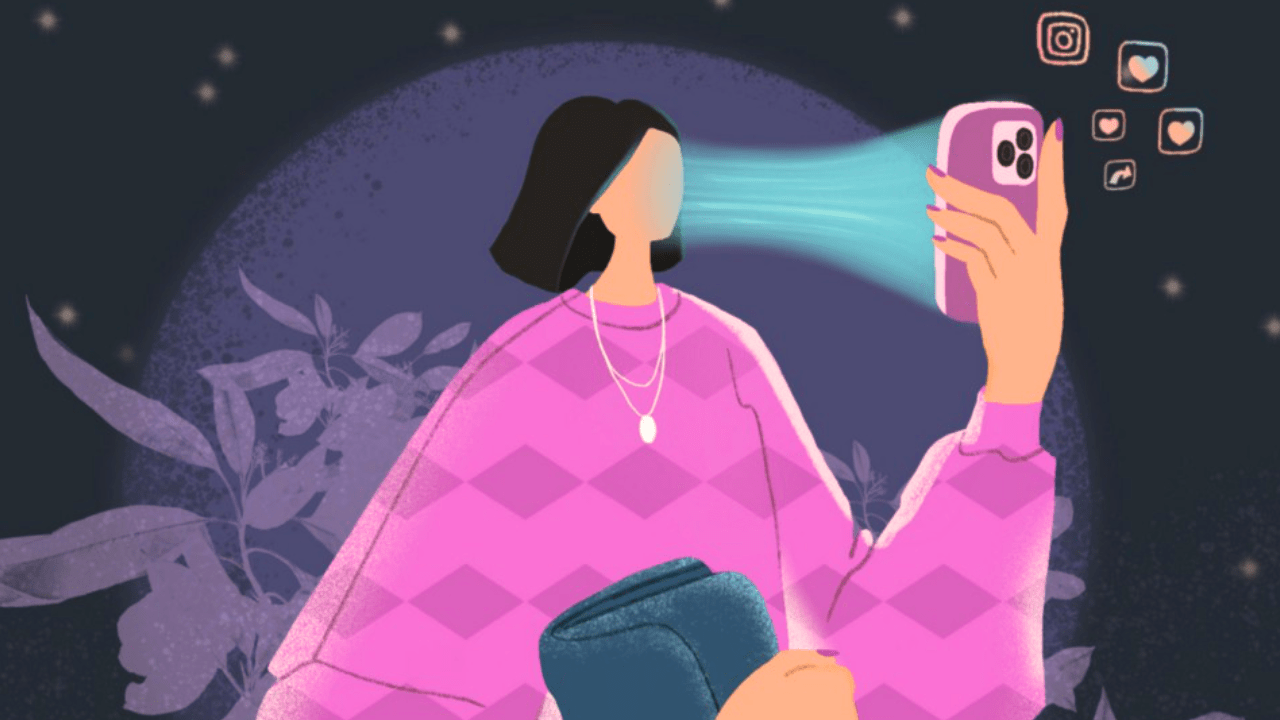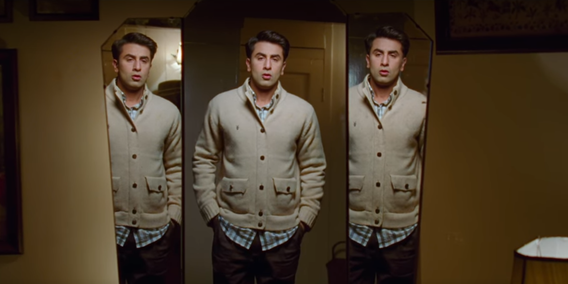The Social Dilemma, a docudrama directed by Jeff Orlowski talks about the grim realities of the virtual world – from constant tracking, invasion of privacy, to thousands of computers in empty basements and ships that are (now) out of our control.The docudrama starts off with the spectacle of a heightened sci-fi drama where former employees of social media giants talk about the reign of social media algorithms.
Personally, watching the movie overwhelmed me – I was anxious, scared and wondered what’s to happen to the human race if we are controlled by technology? I was on the verge of deleting all my apps – until I opened one of them and only saw posts of dogs, cats, food and books recommendations – everything I love!
Has social media helped us cope in recent times? Have we found connections and friends on the internet who have been extremely important to us? Does social media also make you laugh and smile?
Personally, I think the answer for all of the above is an absolute yes!
Social media is more than just machinery designed to propagate political propaganda, privacy invasion, addiction and manipulation. I’m not denying doom-scrolling (consuming large quantities of negative news), or addiction or privacy invasion. But are we really as out of our control as the docudrama would have us believe? Or can we still take charge of our phone, our screen time, our fingers and ourselves?
I also noticed (after almost having a panic attack about how apps use my likes and dislikes for their benefit) that most of the professionals speaking in the movie are mainly talking out of guilt and maybe even shame. They believe they have worked in organisations that made things worse rather than making them better.

There are many different stressors that can affect an individual’s mental health. One of them is social media. The Social Dilemma suggested that young adolescents could be more stressed and isolated from the physical world and actual interactions because of social media. Does research support this?
A longitudinal study by Coyne et al. (2020) found that social media alone did not have a significant impact on mental health for 13 to 20 year olds who were a part of the study.
However, it could definitely be a risk factor. Hostile environments, social comparison, bullying and depressive symptoms are some of the few problems individuals with mental health concerns have experienced because of social media. It can have serious impacts on pre-existing symptoms (Nesland et al., 2020).
Research is now being conducted to discover ways of predicting mental health concerns through social media, connecting individuals to health professionals through social media platforms and focusing on symptomatology of the same. This novel area of research does however face criticism and has a long way to go before it’s validity can be established.
Another aspect that need not be backed by research is the fact that social media provides some of us with a safe space to share and de-stress. But let’s have this notion backed by research anyway. Online spaces have become safe spaces for LGBTQ+ communities to express their gender and sexuality. Caregivers of individuals with dementia found it helpful to have online groups for support and more information.
Social media helps. Today, we might know of a few individuals who have found partners, jobs, pets or even families through social media. It has helped people crowd fund, build resistance, protest and even spread correct information.
Could this yin have a yang? Without a doubt, yes.
Information spreads, but so does misinformation (all of us witnessed this in 2020, didn’t we?). There are support groups but there are also hate mongers. There is protest and resistance for both, the right and the wrong. Unfortunately, research says that lies spread faster than the truth. Here’s why: humans.
Robots and AI are tools that accelerate the spread of information. We are the consumers and producers of the information that is spread, so it is our discretion and not that of technology that curates the news feeds we are exposed to. But fake news (which is also usually exaggerated) usually incites fear, disgust, and surprise is usually more catchy and novel which increases social interaction and hype.

Social Dilemma highlights the fact that propaganda spreads through social media. Echo chambers increase social and political polarization and extremism. Our news feed is like an echo chamber – we follow, like, comment and interact with posts we relate to, and therefore, are shown the same kind of posts in the future and are connected with like-minded people. An echo chamber therefore will only reinforce the beliefs and opinions we already have – shutting out other (or oppositional) views.
These echo chambers have caused damage and have led to conflict, riots and protests. We are constantly exposed to videos, images and articles that relay these conflicts. The speed at which these are brought to us through platforms like Twitter and Instagram, make it akin to real time journalism.
This (Social media) has reduced the social distance between local communal conflict and national communal polarisation. Today, a local communal conflict can be made a national issue in seconds, and a larger communal narrative can quickly be constructed from a patchwork of local incidents.
...When talking about social media, we cannot ignore the penetration of WhatsApp, which has reached more than 200 million users in India (Mashable, 2017). Today, social media plays a significant role in both fighting and magnifying hate speech. It is, in fact, a tool as powerful as the television.
We rely on what The Social Dilemma is telling us: manipulation through social media is polarizing our political views. But here’s the thing: messages are encrypted on WhatsApp and almost nothing depends on an algorithm or ads or posts we like. Interaction therefore, depends on us. However, Whatsapp still remains a major channel for spreading misinformation.
Take for instance what we now call “Whatsapp University”, messages written and forwarded by multiple people. Are they fact checked? We don’t know. Are people still forwarding and reading it? Yes!

But here’s the thing: Many of us must have read 5 different forwarded messages about ways to deal with the virus – out of which, we might choose to act on 2 messages – by doing what they say or by forwarding the message.
This means a lot of this is under our control.
We decide what we want to learn, read and process. Even without algorithms, robots and codes in place, we could still be spreading misinformation, forming echo chambers and sticking to an ideology.
If we choose to forward a cute video of a cat instead of a video that spreads hate – it’s our decision. As much as The Social Dilemma wants to tell us that everything is out of our control, the whole of social media IS actually very much in our control.
The same applies to advertisements. We have always seen ads around us – on bus stops, on television, on newspapers – and some of them might have enticed us to buy a product or two, others don’t matter as much to us. Our choice, our control. And while social media does tap into our interests specifically (not cool because privacy invasion) – if it’s something we like but don’t want to buy – it’s our choice.
At the end of the day, what we see or do not see, our beliefs and opinions could be right or wrong, stronger or weaker due to social media. This means that you are only a click away from spreading (mis)information, love, hatred, introducing yourself to a friend you love, or supporting a protest (for whatever reason). But that one click depends on you.
Personally, I believe The Social Dilemma put the onus of everything terrible happening on social media. It said “yes it’s bad and you’re a part of it” – but what about the good? And what about our choice? What about us?
Even though the movie tries to warn us of something worse that’s coming – what we really need to do is accept that social media is now a part of us, like the newspaper and television is. And remember that we can always control it.
From what we have learnt up till now – social media (even Netflix) can influence us. It can affect us positively and negatively like every other stimulus in our environment. It can have serious negative repercussions too. It does monitor a lot of our activity online. We know that now. But what we do from there on, with that information – is something we choose – if that’s fact checking, debating, forwarding, connecting or forgetting the content altogether – that’s our decision to make.


 Sarika believes she has learnt the most about life from talking to people around her - having meaningful conversations, understanding different experiences & perspectives. She also loves sunsets, coffee and cats as much as she loves great conversation. Her research interests are ever-changing and ever-growing: she’s curious about a lot of things but mental health awareness always remains priority. Apart from talking and making an extensive list of things to research, Sarika loves spending her day reading books, baking, learning new skills, and making videos.
Sarika believes she has learnt the most about life from talking to people around her - having meaningful conversations, understanding different experiences & perspectives. She also loves sunsets, coffee and cats as much as she loves great conversation. Her research interests are ever-changing and ever-growing: she’s curious about a lot of things but mental health awareness always remains priority. Apart from talking and making an extensive list of things to research, Sarika loves spending her day reading books, baking, learning new skills, and making videos.




